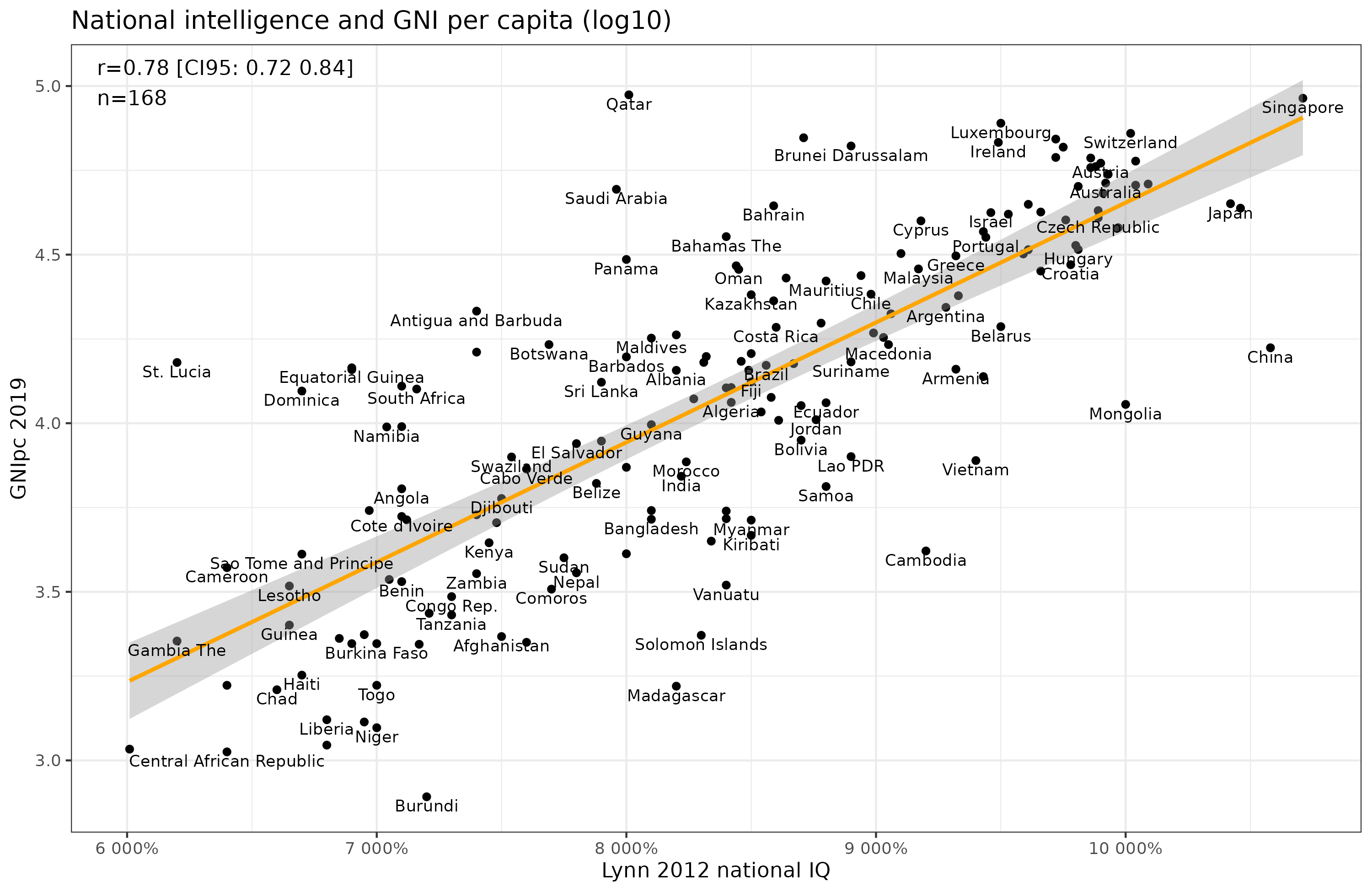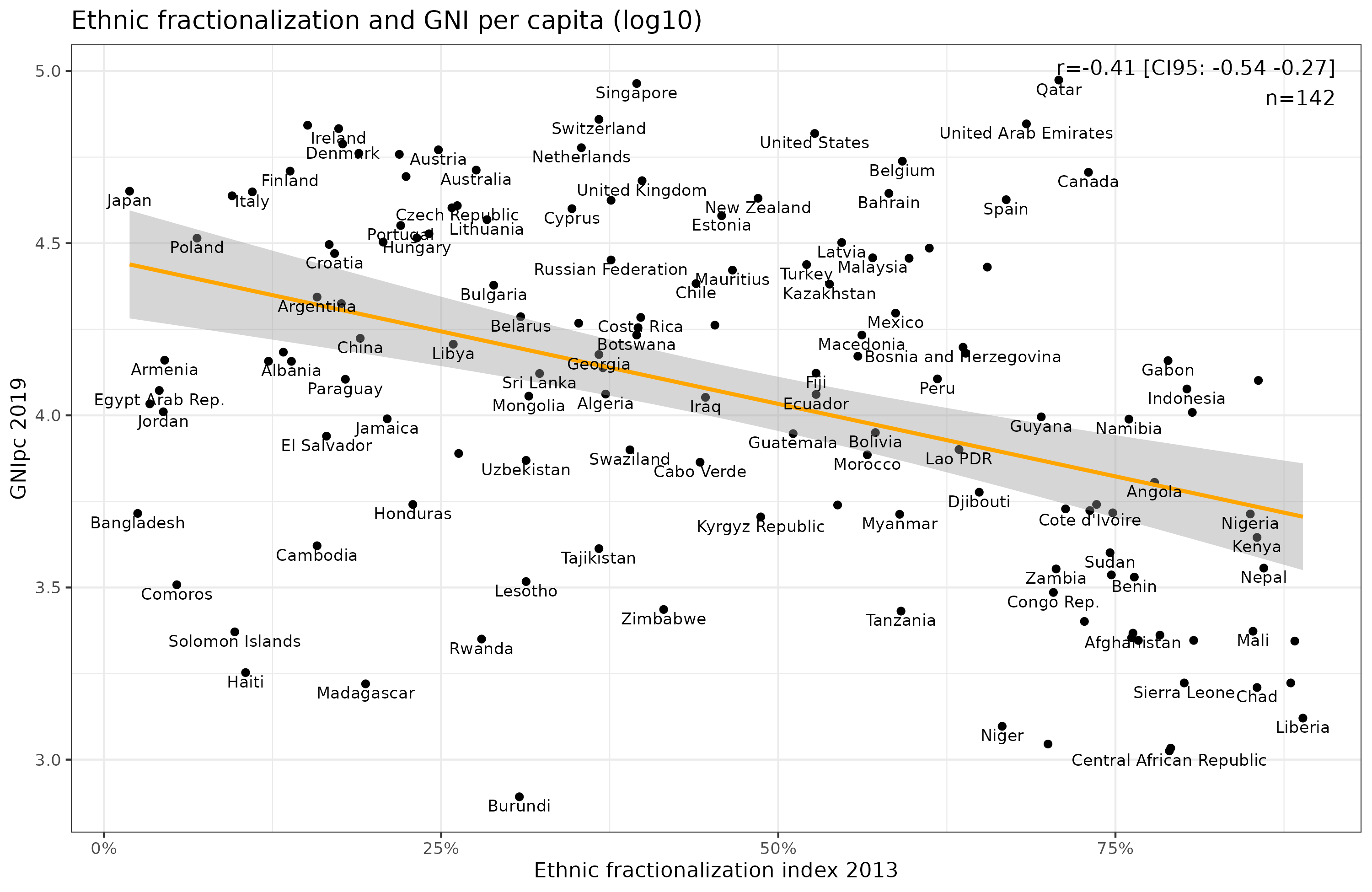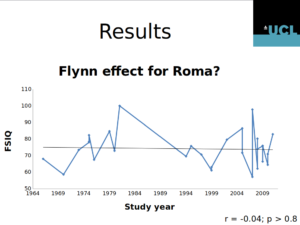Richard Hanania has a new post out: Diversity Really is Our Strength. (Noah Carl has a reply here, and Seb Jensen has a reply here) His piece is part-troll, part-serious in the usual Hanania way. But he has a hypothesis in the post worth examining with data. He examines a plot like this one:

And notes:
It seems that all advanced nations basically converge on some kind of social democracy, and end up mediocre given their potential. The countries that are major outliers in the positive direction, that is, much richer than you would expect from their IQ, tend to have some weird quirks that hinder this natural process. UAE, Saudi Arabia, and Qatar are all monarchies with oil, and Singapore is a kind of soft dictatorship. Luxembourg, Switzerland, and Macao draw in tourist dollars and provide banking services for the globally wealthy.
Interestingly, ethnolinguistic diversity seems to be common among overperformers. Citizens in Qatar make up less than 15% of the population. In contrast, if you look at countries under the line, many seem to suffer from an excess of homogeneity. The worst performing country relative to IQ is easily North Korea. It’s probably the most socially cohesive nation in the world too. Had they had some diversity, perhaps it would’ve been harder to form a totalitarian state based on a socialist ideology that starved its own people. There would’ve been too much discord and instability for one family to turn everyone into slaves.
So it’s a straightforward idea, namely, that ethnic diversity has some incremental positive effect on country wealth controlling for IQ. The theory is not impossible, but consider the basic plot between ethnic fractionalization and GNIpc:

(Note: I used ethnic fractionalization from this paper, which is a nice time series update on the original Alesina paper.)
OK, so a negative correlation of -.41 could in theory become positive, but it’s not likely. Here’s some regression models trying to find this validity:

There are 8 models. 4 models without weights, with increasing number of covariates, and 4 with sqrt(population) weights. All 8 models find national intelligence predicts GNI per capita, and the 4 that tested smart fraction found validity for it (as in our paper). Crucially, all 6 that tested ethnic fractionalization found no effects at all.
And this isn’t because I sneakily used a weird outcome. Here’s some models with other outcomes of interest:

The outcomes are: GDPpc, GNIpc, median income from Gallup surveys, Social Progress Index (made of 50+ indicators), economic freedom, property rights, labor freedom, and government spending (the latter 4 from Heritage Foundation), and economic freedom from Fraser. Of the 9 tests of ethnic fractionalization, only 2 worked, labor freedom and Fraser’s economic freedom index. The latter has a p value of .044 and we tested 9 times, so nothing to get excited about. Government spending shows opposite results for intelligence as of course the wealthier and better countries tend to have bigger states. Not even smart fraction avoids this (also a positive beta, economists dismayed), so maybe this can just be considered part of the collective intelligence scaling hypothesis. Or maybe you need to invoke some political theory about Leviathan.
As such, we can pretty confidently say that ethnic fractionalization — that is, diversity — isn’t a strength insofar as wealth is concerned. Rather, it doesn’t matter except as a proxy for the intelligence of the population. This can be considered good news, and fits in line with IQ nationalism. If diversity itself cannot do much, the effect that matters will be the future effect on the country’s national intelligence level. In America, this question is easy enough because we have 5+ decades of data on Hispanic immigration and their outcomes. They are almost universally worse than the average existing American population. For this reason, their long term impact will be negative, that is, they will erode the country rather than improve it. Here it is curious that economists and economics-minded thinkers usually have a very short-sighted view of immigration. They look at the first generation of immigrants, and see that they often do well in terms of their fiscal impact, and so assume this will continue to be the case. They forget about regression towards the mean, and they forget about age effects. Immigrants that come to a country are usually already adults and ready to work. If they are illegal, they won’t be using many social benefits, so they tend to be good for the country in the short term (net positive effect on the economy). The problem of course is that when they have children, the age effect is reversed. Children spend the first 25ish years as net negatives. Importing immigrants because they are good in the short term is a kind of demographic Ponzi scheme, where one has to keep importing larger and larger amounts of immigrants to pay for the existing ones that are getting old. It’s a foolish, short-sighted solution. The correct, more boring approach is that you have to import people whose long-run effect is at least as good as the current inhabitants. If you do this, your country will keep improving or stay the same.
Do immigrants really undermine support for the welfare state?
It’s a popular idea among certain libertarian economists. Their idea is simple: social trust is akshualy bad, because social trust encourages voters to implement welfare states, and welfare states are bad. So to fight the welfare state, we should import a lot of very different people. As Hanania puts it, “Immigration destroys social cohesion. Good.”. It’s a kind of destroy-the-country-to-save-the-country idea that only an economist could think of. The evidence shown above doesn’t really support this model though. One can find other research showing similar results. Here’s a recent paper (Does diversity foster individualism? The relation of racial-ethnic diversity to individualism-collectivism across the 50 American States):
Recent longitudinal research by others analyzing the relation between racial-ethnic diversity and individualism-collectivism in the 50 American states over the period 2000–2018 suggests that racial-ethnic diversity promotes individualism. The present study used a cross-sectional approach based on 2013 data to determine whether a relation mirroring the longitudinal pattern exists between racial-ethnic diversity and individualism-collectivism across the 50 states. Two measures of state racial-ethnic diversity were related to four measures of state individualism-collectivism using Pearson correlation and partial correlation controlling for state socioeconomic status. All correlations between diversity and individualism were negative and all those between diversity and collectivism were positive. The absolute magnitudes ranged from .43 to .68 for the Pearson correlations and from .43 to .67 for the partial correlations. Contrary to the earlier longitudinal findings, the current results show that states with higher racial-ethnic diversity are less individualistic and more collectivistic.
A much simpler model is that main effects dominate. Hanania is right that most people in the world like socialism. That’s why they keep trying to implement communism despite its abysmal track record. But some people like socialism more than others, and apparently Europeans are fairly low on their liking for socialism (despite inventing it, at least the high-brow version). This means that whenever you import non-Europeans, they tend to vote for more socialism, and you will get more of it in the long run. It can be seen in elections in every western country. Foreigners usually lean left.
The reply to this, I think, is to show that actually the states with the biggest government spending are all run by Europeans. True! I think, however, this reflects the strength of the state in these. My hypothesis is that state spending as total of all spending increases with the size of the economy due to more fundamental reasons. Although Europeans invented communism, most countries that implemented communism were not European countries, but rather Latin Americans, Arabs, Africans, and Asians. The only Europeans that implemented communism ‘by choice’ were Russians, which are distant to the typical northern, central European population which is the largest fraction of the American White ancestry. Furthermore, communism has been substantially promoted by Jews, which are only about 50% European in ancestry. I realize this section is speculative. The main point is that although core Europeans tend to build big state countries, they generally stop short of full-blown communism, which is rather common elsewhere, and much more disastrous than big states.
Conclusion
- Actual data don’t show many benefits or harms of ethnic fractionalization for the economy, controlling for national IQ and smart fraction. Intelligence dominates. According to such findings, it doesn’t matter much what population you have in your country, as long as it’s smart. For other country outcomes, it is good to have northern Europeans. Having a sizable smart fraction is also good.
- Ethnic self-interest theory aside, non-European immigrants vote consistently left-wing and will move the country towards the politics of their homelands, i.e., government failure, corruption, instability etc. If one can somehow select for pro-European values, or generalized conservatism in immigrants, this would be good.

Addendum
Sometimes people ask me why Hanania writes such pieces. I have a 3d chess theory. He does it to provoke the online hereditarians into producing new posts like this one, which can then be promoted. Hanania himself doesn’t promote them, but might signal boost the replies to his posts. Hanania does however promote the main theory, which is the intelligence of nations. I am happy to see this theory of growth promoted! It’s a big change to the usual ‘more money on education’ ideas that politicians have.

